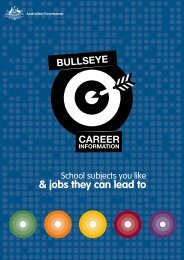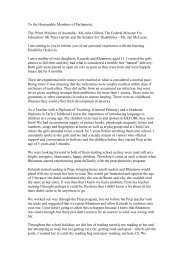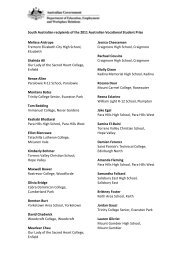Belonging, Being and Becoming - Early Years Learning Framework
Belonging, Being and Becoming - Early Years Learning Framework
Belonging, Being and Becoming - Early Years Learning Framework
You also want an ePaper? Increase the reach of your titles
YUMPU automatically turns print PDFs into web optimized ePapers that Google loves.
LEARNING OUTCOMES<br />
OUTCOME 2: CHILDREN ARE CONNECTED WITH AND<br />
CONTRIBUTE TO THEIR WORLD<br />
•<br />
•<br />
•<br />
•<br />
Children develop a sense of belonging to groups <strong>and</strong> communities <strong>and</strong> an underst<strong>and</strong>ing of the<br />
reciprocal rights <strong>and</strong> responsibilities necessary for active community participation<br />
Children respond to diversity with respect<br />
Children become aware of fairness<br />
Children become socially responsible <strong>and</strong> show respect for the environment<br />
Children develop a sense of belonging to groups <strong>and</strong> communities <strong>and</strong> an<br />
underst<strong>and</strong>ing of the reciprocal rights <strong>and</strong> responsibilities necessary for<br />
active community participation<br />
This is evident, for example,<br />
when children:<br />
• begin to recognise that they have a right to<br />
belong to many communities<br />
• cooperate with others <strong>and</strong> negotiate roles<br />
<strong>and</strong> relationships in play episodes <strong>and</strong> group<br />
experiences<br />
• take action to assist other children to<br />
participate in social groups<br />
• broaden their underst<strong>and</strong>ing of the world<br />
in which they live<br />
• express an opinion in matters that affect<br />
them<br />
• build on their own social experiences to<br />
explore other ways of being<br />
• participate in reciprocal relationships<br />
• gradually learn to ‘read’ the behaviours of<br />
others <strong>and</strong> respond appropriately<br />
• underst<strong>and</strong> different ways of contributing<br />
through play <strong>and</strong> projects<br />
• demonstrate a sense of belonging <strong>and</strong><br />
comfort in their environments<br />
• are playful <strong>and</strong> respond positively to others,<br />
reaching out for company <strong>and</strong> friendship<br />
• contribute to fair decision-making about<br />
matters that affect them<br />
Add your own examples from your context:<br />
26 BELONGING, BEING & BECOMING The <strong>Early</strong> <strong>Years</strong> <strong>Learning</strong> <strong>Framework</strong> for Australia<br />
Educators promote this learning,<br />
for example, when they:<br />
• promote a sense of community within the<br />
early childhood setting<br />
• build connections between the early<br />
childhood setting <strong>and</strong> the local community<br />
• provide opportunities for children to<br />
investigate ideas, complex concepts <strong>and</strong><br />
ethical issues that are relevant to their<br />
lives <strong>and</strong> their local communities<br />
• model language that children can use<br />
to express ideas, negotiate roles <strong>and</strong><br />
collaborate to achieve goals<br />
• ensure that children have the skills to<br />
participate <strong>and</strong> contribute to group play<br />
<strong>and</strong> projects<br />
• plan opportunities for children to<br />
participate in meaningful ways in group<br />
discussions <strong>and</strong> shared decision-making<br />
about rules <strong>and</strong> expectations





